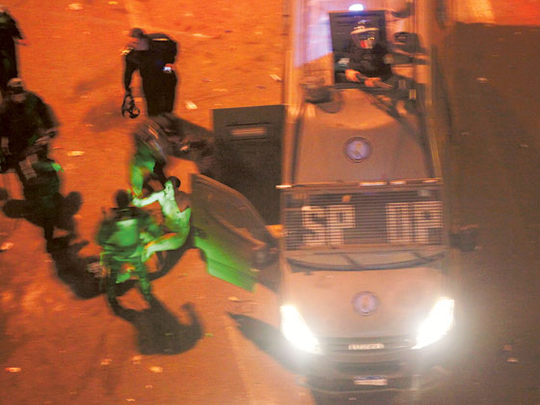
Cairo: They are a bedraggled front line, shock troops with scabbed faces and gunshot wounds, many of them boys with runny noses and sandalled feet, standing beyond police barricades with gasoline bombs, swords and stones.
They are legion, angry young men and grade school dropouts without jobs, prospects or political ideologies. They battle Egyptian police through the fog of tear gas, advancing and retreating over charred streets and shattered glass. They are as persistent as horseflies, an endless buzz at the edge of protest.
“We have no other choice but to fight. The political powers don’t represent me,” said Ahmad Rifai, pulling up his shirt to show off a belly speckled with birdshot wounds. He pointed to a homeless boy at his side.
“A child like this shouldn’t even be fighting, but he has nothing else.”
The forces arrayed against President Mohammad Mursi and his party linked to the Muslim Brotherhood are many: opposition politicians, protest movements, unions and activists. But one of the most volatile threats to the Islamist-led government is embittered youths roaming like ragged armies and harbouring little hope two years after the revolution that overthrew Hosni Mubarak.
That passion and despair played out Friday as tens of thousands of Egyptians protested across the country after a week of deadly riots. Rising dissatisfaction with Mursi was evident as firebombs were tossed over the wall of the presidential palace in Cairo and demonstrators in Port Said, where more than 40 people have died, chanted for their coastal city to secede.
Echoing through the protests were voices from a disparate collection of lost boys and anarchists, including jobless waiters and labourers, university students, hard-core soccer fans known as Ultras, looters and thugs. Their ranks also comprise a new group of youths known as the Black Bloc, whose masked members despise the Brotherhood and suddenly appear in streets and alleys to besiege security forces.
The public prosecutor’s office has characterised the Black Bloc as an “organised group that participates in terrorist acts ... and [commits] crimes that affect national security.”
The danger of such elements has been heightened by a rising supply of arms smuggled from neighbouring Libya. The cities of Port Said and Suez are rife with guns that have been turned on security forces. But the weapons of choice for most young men are rocks, pipes, Molotov cocktails and tear gas canisters fired by police, which they hurl back as they disappear, rags to faces, in gray-white plumes.
“Since the revolution everyone has a weapon,” said Mahmoud Mustafa, standing along a wall stencilled with the profiles of “martyrs” near Tahrir Square. “If I had a job, I wouldn’t even be in this square. There is no opportunity for us. You can’t get married. You can’t find an affordable apartment. At least we were living under Mubarak. Now we don’t even have that.”
His friend, Ashraf Mousa, shook his head, a victim of the tumult that has spoiled thousands of lives as the nation nears economic collapse. Like his compatriots, he rails against the Brotherhood but finds no resonance in the opposition. Instead, his politics are shaped by the anger of betrayal. Fired as a hotel waiter five months ago when unrest kept tourists away, he found kinship on the streets. He was shot by a rubber bullet the other day, which to the wounded is a stamp of bravery and defiance, but also a scar revealing just how far Egypt is from where the revolution had promised it would be.
“We tried to protest peacefully but the police turned on us with violence,” he said. “So now we use violence.”
Two Egypts share Tahrir Square: peaceful protesters with placards and slogans, and youths who prowl its fringes and fight police at barricade walls protecting the parliament and the reviled Interior Ministry.
The clashes often spill beyond the walls. Police give chase down side streets and “thugs” attack buildings, including this week’s ransacking of the Intercontinental Hotel along the Nile.
Security forces fire down from the barricades, while the boys hurl stones skyward, hustling along the walls made of thick concrete squares that are stained with graffiti, giving them the appearance of a child’s building blocks turned into a dangerous toy.
Protesters in Tahrir’s centre say the young men keep the police at the fringes, preventing them from shutting down demonstrations.
In recent days, rains swept the square: Tents were soggy, mud squished underfoot, painted banners smeared. A torched police van, a trophy of sorts, sat next to a man with a megaphone and another wearing a yellow hard hat.
A barefoot girl sold tissues near a boy wearing a gas mask and swinging a stick.
A man clambered over the walls at the square’s southern edge. The boys raised stones, lowering them when they saw he was not police. One young man wore goggles, another a black mask. Homeless boys drifted about, collecting rocks, following orders. A youth with a bandaged nose watched a girl on a scooter, her hair flowing, drive over broken glass toward the heart of the square.
“We want the government to provide us with jobs and homes,” said Mohammad Al Syed, a 22-year-old fighter. “We can’t afford guns, but we’ve seen people with guns who try to infiltrate between us. We’ve also seen Brotherhood people fighting on the side of the police. They fire rubber pellet shots at us.”
A young man who gave his name only as Syed stood ready for battle. “Nothing from the revolution’s demands has been fulfilled,” he said.
“Tomorrow, we are bringing down the regime. We need a government that cares about the country. We need a real leader. Until then, the fighting will continue.”
LAT












